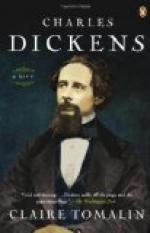FOOTNOTES:
[17] Miss Dickens evidently bears proudly still her pet name of “Mamie,” and signs it to her book.
CHAPTER VII.
With the return from America began the old life of hard work and hard play. There was much industrious writing of “American Notes,” at Broadstairs and elsewhere; and there were many dinners of welcome home, and strolls, doubtless, with Forster and Maclise, and other intimates, to old haunts, as Jack Straw’s Castle on Hampstead Heath, and similar houses of public entertainment. And then in the autumn there was “such a trip ... into Cornwall,” with Forster, and the painters Stanfield and Maclise for travelling companions. How they enjoyed themselves to be sure, and with what bubbling, bursting merriment. “I never laughed in my life as I did on this journey,” writes Dickens, “... I was choking and gasping ... all the way. And Stanfield got into such apoplectic entanglements that we were often obliged to beat him on the back with portmanteaus before we could recover him.” Immediately on their return, refreshed and invigorated by this wholesome hilarity and enjoyment, he threw himself into the composition of his next book, and the first number of “Martin Chuzzlewit” appeared in January, 1843.
“Martin Chuzzlewit” is unquestionably one of Dickens’ great works. He himself held it to be “in a hundred points” and “immeasurably” superior to anything he had before written, and that verdict may, I think, be accepted freely. The plot, as plot is usually understood, can scarcely indeed be commended. But then plot was never his strong point. Later in life, and acting, as I have always surmised, under the influence of his friend, Mr. Wilkie Collins, he endeavoured to construct ingenious stories that turned on mysterious disappearances, and the substitution of one person for another, and murders real or suspected. All this was, to my mind, a mistake. Dickens had no real gift for the manufacture of these ingenious pieces of mechanism. He did not even many times succeed in disposing the events and marshalling the characters in his narratives so as to work, by seemingly unforced and natural means, to a final situation and climax. Too often, in order to hold his story together and make it move forward at all, he was compelled to make his personages pursue a line of conduct preposterous and improbable, and even antagonistic to their nature. Take this very book. Old Martin Chuzzlewit is a man who has been accustomed, all through a long life, to have his own way, and to take it with a high hand. Yet he so far sets aside, during a course of months, every habit of his life, as to simulate the weakest subservience to Pecksniff—and that not for the purpose of unmasking Pecksniff, who wanted no unmasking, but only in order to disappoint him. Is it believable that old Martin should have thought Pecksniff worth so much trouble, personal




